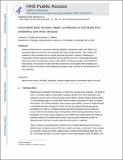Incomplete base excision repair contributes to cell death from antibiotics and other stresses
Author(s)
Gruber, Charley C.; Walker, Graham C.
DownloadAccepted version (583.6Kb)
Publisher with Creative Commons License
Publisher with Creative Commons License
Creative Commons Attribution
Terms of use
Metadata
Show full item recordAbstract
Numerous lethal stresses in bacteria including antibiotics, thymineless death, and MalE-LacZ expression trigger an increase in the production of reactive oxygen species. This results in the oxidation of the nucleotide pool by radicals produced by Fenton chemistry. Following the incorporation of these oxidized nucleotides into the genome, the cell's unsuccessful attempt to repair these lesions through base excision repair (BER) contributes causally to the lethality of these stresses. We review the evidence for this phenomenon of incomplete BER-mediated cell death and discuss how better understanding this pathway could contribute to the development of new antibiotics.
Date issued
2018-11Department
Massachusetts Institute of Technology. Department of BiologyJournal
DNA Repair
Publisher
Elsevier BV
Citation
Gruber, Charley C. and Graham C. Walker. “Incomplete base excision repair contributes to cell death from antibiotics and other stresses.” DNA Repair 71 (2018): 108-117 © 2018 The Author(s)
Version: Author's final manuscript
ISSN
1568-7864